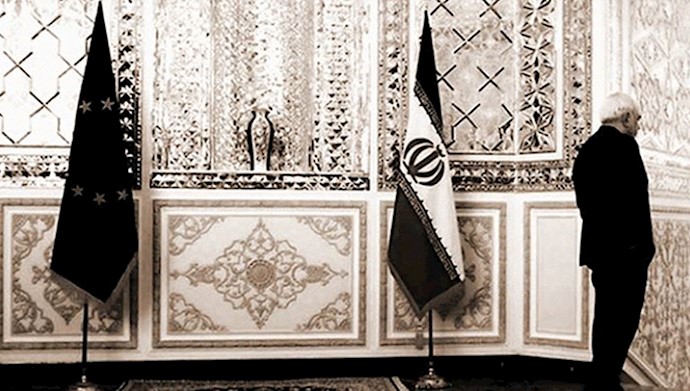Analysis by MPOI/MEK
Jan. 8, 2019 – Recent comments by Iran’s foreign minister that the goal of the nuclear deal was not economic has provoked heated debates in Iran, especially among members of the faction close to Iranian regime Supreme Leader Ali Khamenei.
The IRGC-run Fars News Agency highlights the contradiction of Zarif’s comments with Ali Khamenei’s June 2018 statements and writes: “The goal of the negotiations was to lift the sanctions.”
In an interview with Quds Online website, Mehdi Mohammadi, an Iranian pundit in nuclear and international affairs, says: “Let’s assume that Mr. Zarif’s comments that economic issues had no place of consideration in the JCPOA were honest and that his expression was not a product of public opinion pressures on the government because the JCPOA has no economic results, [in that case] the question is, if the goal of the JCPOA was not sanctions relief, then what was the goal of the JCPOA? In fact, Mr. Zarif’s comments have thrown Rouhani’s government out of the frying pan and into the fire. [Now] the government has to answer the bigger and more dreadful question that if your goal was not to thwart the economic perils and you’ve not negotiated to solve the economic difficulties, then to what end did you negotiate?”
On the same day, Kayhan newspaper, close to the regime’s Supreme Leader, also published an article titled, “Do you remember these titles?”, and wrote: “In an interview with an internal newspaper, our country’s foreign minister recently said, ‘the JCPOA created an equation between our measures and the Western ones. Our measures were nuclear, and their measures were economic. Therefore, there is no doubt that the west has failed to live up to its commitments.’ But he thinks that the goal of the JCPOA was not economic at all… Eventually, considering the absolute damage of the JCPOA and the near-zero achievements of the nuclear agreement, the reformist officials and media, instead of apologizing and striving to make up for these damages, are minimizing popular demands, create fictitious achievements and finally change the initial problem.”
Regardless of the opposing factions’ claims and disputes, fact is that the Iranian regime went to the negotiating table because of an economic deadlock with the goal to save itself a deteriorating economic situation.
Assuming that the nuclear negotiations had no economic goals and the Iranian economy was stable and not susceptible to sanctions, what on earth could have persuaded the ruling theocracy in Iran to seek the negotiation table and why would the Rouhani government tout the JCPOA as one of its major achievements?
In June 2015, a little over a month before the nuclear deal was reached in Vienna between the P5+1 and Iran, Hassan Rouhani said that solving the economic, environmental, and even water supply issues is related to the nuclear deal and sanctions relief.
“The unjust sanctions must go, so that investment comes and the problems of the environment, employment, the industry and people’s potable water are solved…,” Rouhani said.
Comparing sanctions to an illness that starts with a mild fever, Rouhani said: “Initially, no one paid attention to this mild fever, but when the patient fell to the ground and couldn’t move anymore, we sought to heal the sickness. Some didn’t know the meaning of sanctions, but gradually our problems increased.”
A few months after the JCPOA was forged, in an open letter to Rouhani, Khamenei voiced his blessings for the agreement but raised a few conditions that must be met. Excerpts from Khamenei’s October 2015 letter to Rouhani follow:
“First: Since Iran mainly accepted the negotiations with the goal to cancel the unjust economic and financial sanctions… European Union’s and U.S. president’s statements must clearly say that all the sanctions have been removed. Any suggestions that the structure of the sanctions will remain, is considered a violation of the JCPOA.”
Khamenei’s statement clearly shows that economic sanctions—oil and banking sanctions on top of them—had paralyzed the Iranian regime and forced it to the negotiation table to prevent a total economic collapse and the disintegration and meltdown of the Islamic Republic.
In other words, the Iranian regime chose between bad and worste. That’s why the Iranian opposition considers the JCPOA—although it bought the Iranian regime some time and breathing room—a strategic chalice of poison for the Islamic Republic. The Islamic Republic’s ideology and even its constitution is based on exporting terrorism and chaos branded as revolution and Islamic missionaries. Behaving like a normal and responsible member of the 21st century international community is a painful and toxic mode of behavior for a religious expansionist state.
Anyway, the current controversy of whether the JCPOA had economic goals or not will serve no other purpose than to intensify the inner-fighting among the ruling factions.
The conservatives try to distance themselves from the JCPOA from the beginning and paint the so-called moderates as the losers who gave everything in exchange for nothing, while the so-called moderates will try to show that the Supreme Leader himself gave them the green light from the get-go and that the negotiations were under his supervision all the way to the final agreement.
The net result is a widening gap among the ruling elite that renders the regime ever more fragile in the face of an increasingly discontent and restive population.
It’s not unprecedented. Even rats desert a sinking ship. Arguing about the blame is just the beginning.





